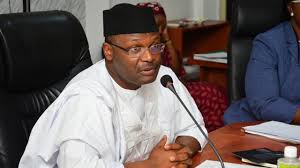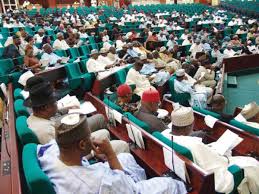Mahmood Yakubu presents report on Nigeria’s largest conducted election

By Tunde Opalana
The 2019 general election conducted between February 23 and March 9 has been adjudged the largest electoral exercise to be undertaken in Nigeria.
The election, which was the sixth if its kind since return of democracy in 1999 was contested by 24,353 candidates nominated by 91 political parties for 1,558 constituencies and with a voter population of 84,004,084 spread across 119,973 polling units and 57,023 voting points across the country.
The Chairman, Independent National Electoral Commission (INEC), Prof. Mahmood Yakubu made this disclosure on Friday at the virtual presentation of the report of the 2019 general election and the report of Commission’s retreats and stakeholders engagements on the review of the election in Abuja.
On personnel, he said a total of 821,686 adhoc staff were engaged for the election and that the Commission also accredited 71,256 domestic and international observers as well as 11,250 domestic and international journalists for the election.
The Daily Times recalls that the Commission conducted the 2019 General Election comprising the Presidential and National Assembly elections on 23rd February 2019 and the Governorship, State Houses of Assembly and FCT Area Council elections on 9th March 2019.
Presenting the 13 chapters report of the 2019 General Election, the chairman said it covers “the major issues associated with the conduct of the election.
These include the vision, mission, opportunities and challenges of the Commission upon its inauguration on 9th November 2015, the lessons learnt from the conduct of over 170 off-cycle governorship elections and bye-elections, the review of the 2012-2016 Strategic Plan (SP) and Strategic Programme of Action (SPA), the 2015 Election Project Plan (EPP) and the design, formulation and implementation of the 2017-2021 Strategic Plan, Strategic Programme of Action and the 2019 Election Project Plan.
Yakubu said the report “examines in detail the key activities, preparations and challenges associated with the conduct of the 2019 General Election ranging from registration of new political parties, conduct of continuous voter registration, monitoring of party primaries, candidate nomination process and party campaigns, the recruitment and training of ad-hoc staff and the accreditation of election observers and party agents.
“The report also discussed the processes and procedures for the conduct of the General Election, including the deployment of personnel and materials, the operation of the Situation Room and Collation Centres and the organisation and management of the Counting, Collation and Declaration of results at National, State, LGA and Registration Area levels.
“It also deals with pre-election and post-election litigations. The last section of the report focuses on the preparation and delivery of the election in the 36 States of the Federation and the FCT.
The concluding part of the report dwells on the critical issues and challenges associated with the preparation and conduct of the election, lessons learnt and specific recommendations for addressing them”.
He said the second report covers the outcome of internal debriefing meetings and external engagements with electoral stakeholders held from 28th May to 12th July 2019.
The aim was to evaluate the Commission’s actions, processes and procedures before, during and after the election.
While the internal review involved the Commission’s debriefing sessions with its Electoral Officers, Administrative Secretaries, Directing Staff and Resident Electoral Commissioners to critically appraise its performance in the conduct of the election, the engagement with external stakeholders involved meetings with leaders of political parties, members of the InterAgency Consultative Committee on Election Security (ICCES), Civil Society Organisations and the Media.
Consisting of a total of 12 engagements in six separate internal and external meetings, the review exercise enabled the Commission to listen to its officials, receive feedbacks from relevant stakeholders and learn vital lessons in the continuing effort to improve the conduct of elections in Nigeria.
This report, he added, “identifies the main issues discussed in the review exercise and provides detailed assessment on the opportunities and challenges associated with each of the issues as well as actionable proposals for resolving them.
“It contains 180 recommendations that either require administrative action by the Commission or amendments to strengthen the existing electoral legal framework by the National Assembly.
Some of the recommendations that require administrative action by INEC are already being implemented resulting in improved management of the electoral process as seen in the recent off-cycle Governorship elections in Edo and Ondo States.
We are similarly engaging with the National Assembly on aspects of the recommendations that require legislative action”.
Barrister Festus Okoye, the Chairman of the Information and Voter Education Committee (IVEC), was saddled with the responsibility of producing the official account of the conduct of the 2019 General Election while the second Committee chaired by Dr. Muhammed Lecky, Chairman of the Planning, Monitoring and Strategy Committee (PMSC), was charged with the responsibility of producing a report on the review of the election based on the outcome of the Commission’s Retreats and Stakeholder Engagements held from 28th May to 12th July 2019.
READ ALSO: Mahmood Yakubu’s second chance
Present at the presentation were representatives of INEC’s partners such as the European Centre for Electoral Support (ECES) and the International Foundation for Electoral Systems (IFES) which supported the review of the 2019 General Election as well as the printing of the reports.
“The two organisations, along with Friedrich-Ebert-Stiftung (FES), have also supported the Commission in other ways, including the printing of the Commission’s Policy on Conducting Elections in the Context of the COVID-19 Pandemic (2020), Voter Code of Conduct (2020) and Code of Conduct and Rules of Engagement for Security Personnel on Electoral Duty (2020) all of which have already been publicly disseminated”, said Yakubu.








